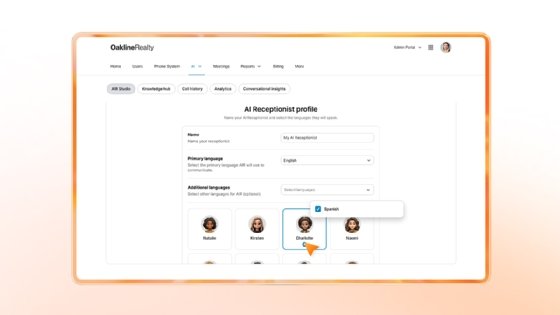
Getty Images/iStockphoto
'AI receptionist' IVR takes flight with customer service
Traditional rules-based interactive voice response technology could be on its way out.
AI agents that can answer business phones and route -- and even resolve -- customer service calls more efficiently than traditional technologies are here.
Small businesses, which have much smaller and less complex IT footprints than large enterprises, are leading the way in ripping out interactive voice response (IVR) answering systems and replacing them with AI agents.
Until now, businesses have had to choose between hiring more administrative employees they can't afford to answer phones, or send customers into an "IVR death spiral" to get to sales or service, said Alan Brundage, chief operating officer of Jay-Hill Repairs, a Fairfield, N.J.-based company that services commercial kitchen gear throughout the state.
"AI does that a little bit better -- it routes [calls] very well," said Brundage, whose 50-employee company recently ditched its IVR for an AI agent.
Contact center-as-a-service stalwarts such as RingCentral, AWS, Five9, Genesys, Nice, Twilio and Sprinklr offer AI agents to answer incoming calls. Others, such as CallMiner, also provide their versions. The technology could eventually replace the current IVR and its rigid menu-driven topography, which doesn't always pay off the time customers invest in navigating it.
Small businesses can be more nimble than large enterprises in taking advantage of AI agents. They also don't have big contact centers with IT stacks that reverberate with unintended consequences when one application -- such as IVR -- is ripped and replaced.
That's what RingCentral has seen, said Jake Fry, a solutions engineer at the company. More than 3,000 customers, including early adopters prior to its June 30 release, have launched RingCentral's AI Receptionist agent.
While some enterprises are on their way to adopting phone-answering AI agents, small businesses that have high volumes of customer calls -- such as car dealers, salons, doctors' and dentists' offices, and insurance providers -- have jumped right in, according to RingCentral.
"There's not a company out there that doesn't have an AI initiative -- half of them don't know what the heck that means, but they know they need to throw AI at something," Fry said.
Keeping commercial kitchens cooking
At Jay-Hill, restaurants and other commercial kitchens across the Garden State call at their worst time -- when machinery such as ovens, fryers, refrigerators and freezers break down, often during peak hours of breakfast, lunch and dinner.
The company is replacing its IVR with RingCentral's AI Receptionist. So far, after integrating content from the company's website regarding which brands of equipment services it services and pricing data, Brundage said that Jay-Hill has greatly reduced the less-urgent calls from prospective customers who are just looking for general information and can focus on customers who have more urgent repair calls that need a truck dispatch.
Not only has the AI agent reduced the number of calls that technicians and office staff must field in a day, but it has also proven to be a better routing tool for the technicians, Brundage said.
The IVR might have sent a call to the wrong technician or a billing question to the wrong person, which wastes time for both the customer and the company, he said. AI Receptionist is more accurate than IVR, and it integrates with Jay-Hill's ERP and CRM systems, which can also help save time when a technician is lining up a truck to visit a customer.
Jay-Hill was an early adopter of AI Receptionist, and the company experimented with it earlier this year by turning it on during peak mealtime hours. Those initial tests reduced live call volume by 5%, Brundage said.
He said that at first, he worried about how the customers -- especially those in a situation where crucial equipment was not working at their restaurants -- would react negatively to something that announces itself as AI, so they paid close attention to playbacks of calls.
"We wanted to see how many times people were just going, 'Oh, this is AI. Give me a representative! Representative!' and screaming 'Representative!' into the phone," Brundage said. "We had that -- not as much as I thought we would -- but we did get a little bit of that."
Once Jay-Hill saw that the customers accepted the AI agent and measured success with better call routing and resolving some of the calls staff had to do before, it's moving forward with the next phase: AI-assisted dispatching of repair technicians. After collecting and confirming what needs to be fixed and the location of the customer, AI Receptionist sets in motion the right truck, equipped with the right parts, and texts the customer details.
He predicted that customers will likely appreciate the automated texts, especially in their typically loud environments.
"If you've ever been in a commercial kitchen, it's as loud or as chaotic as the TV shows make it out to be," Brundage said. "I joke that if you watch Hell's Kitchen or The Bear, those are mild in comparison."

Private security on call
Music City Protection is another small business of about 40 employees that's adopting AI Receptionist. The Nashville firm offers numerous security services, including executive protection, construction details, armed transport and security for corporate buildings and events like weddings.
Brittanee' Hughes, director of business administrations, said only two people answer the phones at Music City Protection's offices. Many of the calls are, like at Jay-Hill, people looking for information about the company -- services, pricing or security training on earning a Tennessee license for handgun carry, armed security and unarmed security.
Music City Protection decided to be an early adopter of AI Receptionist instead of hiring new administrative staff. The phone rang a lot before the company turned on the AI agent, but after training it, running extensive tests, updating website content and fine-tuning business processes, call volume is down 60%, Hughes said.
Calls routed to Hughes' phone now involve direct business, like people ready to sign up for services, prospective employees applying for jobs or trainees who want to take the company's courses. While AI can handle many pricing and scheduling questions, the company has set up an exception for when a prospective customer asks for a large quote and routes that straight to Hughes' phone.
AI Receptionist has automated many processes around the company's trainings, such as answering students' questions about enrollment or next steps after they complete a course. Hughes advises companies that use agents such as AI Receptionist to regularly check call logs and monitor what drives hangups to make sure they're not missing out on business leads. That should be done on an ongoing basis, but especially during the early days of using the technology.
"During that trial period, I had a lot of friends, a lot of employees and even myself and our chief of security operations doing a lot of calling, asking questions or intentionally trying to trip [the agent] up to see if this is a response that we're satisfied with," Hughes said. "You do get those one-off cases, but you don't want to miss an opportunity because of something that you didn't get a chance to fully vet."
Mass adoption coming?
When set up well, AI agents that answer the phone can improve on standard contact center metrics such as customer satisfaction, time to answer and hold time compared with IVR. The systems can also perform more comprehensive call analytics because they transcribe every conversation, as opposed to manually handpicked calls with technology that predates AI. These agents can also offer information on call volume and type, which can inform contact center workforce management.
Other benefits to the technology both Brundage and Hughes point out -- as well as the industry association Conversational Design Institute -- include 24/7 availability, cost efficiency, more accurate call routing and deeper data collection.
RingCentral's Fry said that in the case of AI Receptionist, early adopters have used call analytics to identify calls that the agent cannot solve. Then, based on that information, they make decisions such as continuing to allow these calls to go to a human or voicemail, updating a knowledge base or other website content, or retraining the AI to better address or route customer questions.
"Analytics is a great ROI tool for a customer to validate that it's worth it," Fry said. "They are getting insight into what calls are resolved, versus unresolved."
In AI Receptionist's early days, marketers have also crossed over into customer service to use the agent's conversational insights feature, Fry added. Seeing what the customers are talking about -- and asking for help with -- can inform new products or marketing campaigns.
Don Fluckinger is a senior news writer for Informa TechTarget. He covers customer experience (CX), digital experience management and end-user computing. Got a tip? Email him.








